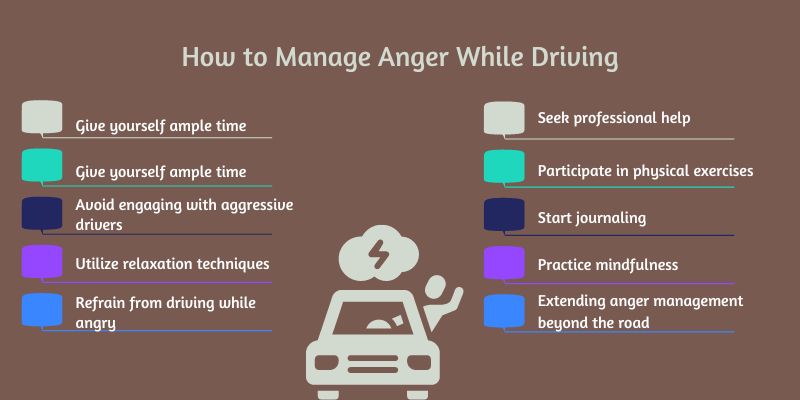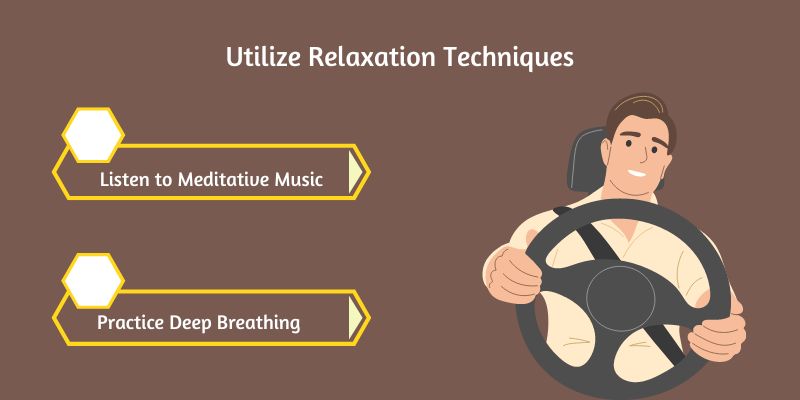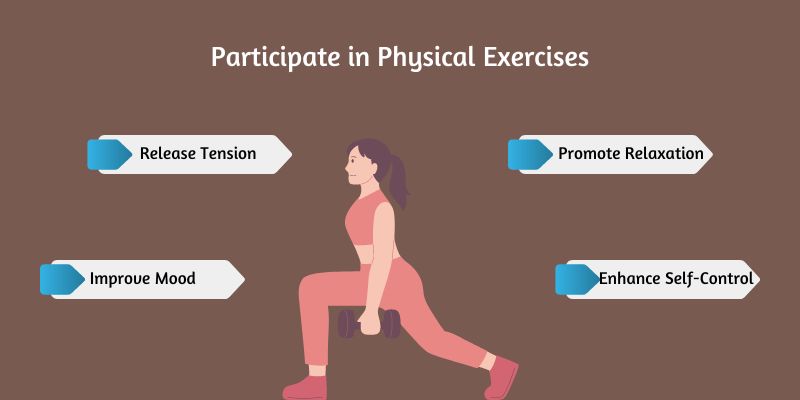
How to Manage Anger While Driving
Dealing with traffic can be a daily source of frustration and stress for drivers. From heavy congestion to encountering reckless behavior on the road, it’s no surprise that driving can cause anger and agitation.
However, managing anger while driving is crucial for personal safety and promoting a culture of responsibility and respect on the roads.
So the important question is, how to manage anger while driving!
According to recent studies, many drivers perceive behaviors such as running red lights and driving aggressively as extremely dangerous.
According to the AAA Foundation for Traffic Safety research, 83% of respondents consider driving through a red light a severe hazard. In comparison, 89% view aggressive driving maneuvers, such as sudden lane changes and tailgating, as equally risky.
These findings highlight the importance of addressing anger and aggression behind the wheel to prevent potential accidents and ensure the safety of all road users.
Research indicates notable differences in driving behavior among various population groups. For instance, individuals categorized as Aggressive Drivers tend to be younger, averaging around 40 years of age, approximately 13 years younger than members of other driving groups.
Understanding these demographic patterns can offer valuable insights into the underlying factors contributing to aggressive driving behaviors and inform targeted interventions to promote safer driving habits.
This blog explores practical strategies for managing anger while driving, from adopting a calm and patient mindset to implementing techniques for defusing road rage incidents.
By cultivating awareness, patience, and responsible driving habits, we can all contribute to creating a safer and more harmonious driving environment for everyone on the road.
Understanding Road Rage

Road rage refers to the extreme expression of anger or frustration while driving, often leading to reckless and dangerous behaviors on the road.
It includes a range of aggressive actions, such as excessive speeding, abrupt lane changes without signaling, tailgating, yelling or gesturing at other drivers, and even physical altercations.
The underlying causes of road rage can vary widely, including stress, frustration, perceived disrespect from other drivers, or personal issues that drivers bring behind the wheel.
Additionally, traffic congestion, long commutes, and time pressure can exacerbate anger and impatience, increasing the likelihood of aggressive driving behaviors.
Understanding road rage is crucial for addressing its impact on road safety. Not only does road rage endanger the driver and passengers involved, but it also poses significant risks to other road users and pedestrians.
Aggressive driving behaviors are major contributors to road accidents, injuries, and fatalities.
Effective strategies for managing road rage involve:
- Promoting awareness of emotions while driving.
- Practicing patience and empathy towards other road users.
- Adopting defensive driving techniques to avoid confrontations.
Education, public awareness campaigns, and enforcement of traffic laws also play vital roles in preventing and reducing road rage incidents.
By comprehensively addressing the consequences of road rage and its contributing factors, we can work towards creating safer roadways and fostering a culture of respect, patience, and responsible driving behavior.
10 Tips to Manage Anger While Driving

Anger while driving is a common experience that can lead to unsafe behaviors on the road. Adopting proactive strategies that promote calmness and safety is essential to effectively managing anger while driving.
Here are some effective strategies to manage anger while driving:
Let’s explore these strategies individually so you can use them to deal with all types of anger issues while on road.
1. Give Yourself Ample Time

One effective way to manage anger while driving is to give yourself ample time to reach your destination. Planning your journey with extra time allows for unexpected delays, reducing the likelihood of feeling rushed or stressed while behind the wheel.
By avoiding time pressure, you can maintain a more relaxed mindset and respond to traffic challenges with greater patience and composure.
Allowing for extra time can help mitigate the frustration that often accompanies traffic congestion or unexpected delays. Instead of feeling overwhelmed by circumstances beyond your control, you can approach these situations with acceptance and adaptability.
This mindset shift can significantly reduce the risk of experiencing anger or aggression while driving, promoting safer behaviors and better road safety.
Giving yourself ample time to reach your destination is a proactive strategy for managing anger while driving.
By planning and allowing extra time, you can minimize stress, frustration, and the potential for unsafe driving behaviors, contributing to a safer and more pleasant driving experience for yourself and others on the road.
2. Practice Understanding
Managing anger while driving requires understanding and empathy toward oneself and others on the road. Recognizing that everyone experiences frustrations and challenges while driving can help cultivate a more patient and tolerant mindset.
Practice understanding by acknowledging that other drivers may be dealing with similar stressors or issues, leading to their behaviors on the road.
3. Avoid Engaging with Aggressive Drivers

One effective strategy for managing anger while driving is to avoid engaging with aggressive drivers. Rather than escalating conflicts or confrontations, it’s best to disengage from aggressive behavior and focus on maintaining your safety.
Avoid responding to aggressive gestures or provocations, as this can further fuel anger and increase the risk of dangerous situations on the road. Instead, practice defensive driving techniques, such as maintaining a safe following distance and allowing aggressive drivers to pass safely.
By practicing understanding and avoiding engagement with aggressive drivers, you can reduce the likelihood of escalating conflicts and maintain a safer driving environment for yourself and others on the road.
4. Refrain From Driving While Angry
One of the most crucial strategies for managing anger while driving is to refrain from getting behind the wheel when feeling angry or emotionally charged.
Driving while angry can impair judgment, increase the likelihood of aggressive behaviors, and compromise safety on the road.
When feeling angry, it’s essential to take a moment to calm down before starting your journey. Practice deep breathing exercises, listen to soothing music, or take a short walk to help release tension and restore emotional balance.
Avoid getting behind the wheel until you feel calm and composed enough to drive safely.
Driving while angry puts yourself at risk and endangers the lives of other road users. Refraining from driving while angry demonstrates responsibility and respect for your safety and that of others.
If anger persists, consider seeking support from a trusted friend or professional to address underlying issues and develop healthy coping mechanisms.
Refraining from driving while angry is fundamental in promoting road safety and managing anger effectively. By prioritizing emotional well-being and safety, you can contribute to a safer and more peaceful driving environment for everyone.
5. Utilize Relaxation Techniques

When managing anger while driving, effective relaxation techniques are essential. These techniques can help reduce stress and promote a sense of calmness, allowing you to navigate challenging situations on the road more quickly.
- Listen to Meditative Music: Playing soothing music can help create a peaceful atmosphere in the car, reducing feelings of anger and frustration. Choose music with slow rhythms and gentle melodies to promote relaxation and tranquility while driving.
- Practice Deep Breathing: Deep breathing exercises are a powerful way to reduce stress and tension in the body. Take slow, deep breaths, inhaling through your nose and exhaling through your mouth. Focus on the rhythm of your breath, allowing it to slow down and deepen with each inhalation and exhalation. This can help lower your heart rate, relax your muscles, and clear your mind, making it easier to manage anger while driving.
6. Extending Anger Management Beyond the Road
Effectively managing anger while driving extends beyond the confines of the road and can positively impact various aspects of life. Individuals can cultivate a calm demeanor and enhance overall well-being by incorporating anger management techniques into daily routines and interactions.
- Enroll in a Road Rage Class: Enrolling in a road rage class offered by Mastering Anger can help you deal with angry emotions. This class can help you understand why you are angry and the causative factors. After finding out the problem, you can implement the newly learned strategies to control your anger while driving.
- Practice Mindfulness: Cultivating mindfulness involves being fully present in the moment and observing thoughts and emotions without judgment. Incorporate mindfulness practices such as meditation or mindful breathing into your daily routine to develop greater self-awareness and emotional regulation skills.
- Communicate Effectively: Improving communication skills can help prevent misunderstandings and conflicts that may trigger anger. Practice active listening, empathy, and assertiveness in your interactions with others, fostering understanding and cooperation in both personal and professional relationships.
- Seek Support: Don’t hesitate to seek support from friends, family, or mental health professionals if you struggle with managing anger. Therapy, support groups, and counseling can provide valuable insights, coping strategies, and emotional support to navigate challenging situations more effectively.
- Engage in Stress-Relief Activities: Incorporate stress-relief activities such as exercise, hobbies, or relaxation techniques into your daily routine to promote overall well-being and reduce stress levels. Engaging in enjoyable and fulfilling activities can help alleviate tension and prevent anger from building up.
By extending anger management beyond the road and integrating these strategies into everyday life, individuals can cultivate greater emotional resilience, enhance relationships, and lead a more balanced and fulfilling life. Remember that managing anger is a continuous process, and practicing these techniques consistently can lead to long-term benefits for mental and emotional health.
7. Participate in Physical Exercises

Regular physical exercise is an effective way to manage anger and promote overall well-being. Physical activity helps release built-up tension and stress, allowing individuals to channel their energy constructively.
Here are some benefits and tips for incorporating physical exercises into anger management:
- Release Tension: Physical exercises such as jogging, cycling, or strength training provide an outlet for releasing pent-up emotions and stress accumulated throughout the day. Engaging in vigorous physical activity helps dissipate adrenaline and cortisol, the hormones associated with anger and stress.
- Promote Relaxation: Exercises like yoga, tai chi, or Pilates focus on controlled movements and deep breathing, promoting relaxation and mindfulness. These activities help calm the mind, reduce muscle tension, and improve overall emotional well-being.
- Improve Mood: Physical exercise stimulates the release of endorphins, the body’s natural mood enhancers, which can help elevate mood and alleviate feelings of anger and frustration. Regular exercise is associated with reduced levels of anxiety, depression, and irritability.
- Enhance Self-Control: Engaging in physical activities that require discipline and focus, such as martial arts or team sports, can help individuals develop self-control and impulse management skills. Learning to regulate emotions and reactions in the context of physical challenges translates into better anger management in daily life.
Adding physical exercises into your routine can be as simple as taking a brisk walk during breaks, joining a fitness class, or dedicating time to weekend outdoor activities.
By prioritizing regular physical activity, individuals can effectively manage anger, improve mood, and enhance overall mental and physical well-being.
8. Start Journaling
Journaling is a powerful tool for managing anger and gaining insight into triggers and emotions. By expressing thoughts and feelings on paper, individuals can constructively process and reflect on their experiences.
Here are some benefits and tips for incorporating journaling into anger management:
- Emotional Outlet: Writing in a journal provides a safe space to express anger, frustration, and other challenging emotions without fear of judgment. It allows individuals to release pent-up feelings and gain a sense of relief and catharsis.
- Identify Triggers: Keeping a journal can help individuals identify patterns and triggers contributing to anger. Individuals can gain clarity and insight into their reactions by documenting situations that provoke anger and examining underlying thoughts and emotions.
- Develop Self-Awareness: Journaling promotes self-awareness by encouraging individuals to reflect on their thoughts, behaviors, and reactions. Through regular writing, individuals can gain a deeper understanding of their emotions, values, and beliefs, paving the way for positive change and growth.
- Problem-Solving: Writing in a journal can facilitate problem-solving and decision-making by exploring alternative perspectives and solutions to challenging situations. It provides a structured format for brainstorming ideas and developing action plans to address anger triggers effectively.
To incorporate journaling into your anger management routine, set aside regular time each day to write in your journal, whether in the morning to set intentions for the day or in the evening to reflect on experiences.
Writing freely without censoring or editing your thoughts allows emotions to flow naturally onto the page.
Experiment with techniques like free writing, gratitude journaling, or guided prompts to find what works best for you. With consistent practice, journaling can become a valuable tool for managing anger, promoting self-awareness, and fostering emotional well-being.
9. Practice Mindfulness
Mindfulness is a powerful technique for managing anger by cultivating present-moment awareness and non-judgmental acceptance of thoughts and emotions.
Incorporating mindfulness practices into daily life can help individuals respond to anger triggers with greater clarity, compassion, and resilience.
Here are some benefits and tips for practicing mindfulness:
- Emotional Regulation: Mindfulness allows individuals to observe anger and other emotions without reacting impulsively or getting carried away. By cultivating awareness of bodily sensations, thoughts, and feelings in the present moment, individuals can respond to anger triggers with calmness and composure.
- Reduce Stress: Mindfulness practices such as meditation, deep breathing, or body scan exercises help reduce stress and promote relaxation. By activating the body’s relaxation response, mindfulness counteracts the physiological arousal of anger and stress, leading to greater emotional balance and well-being.
- Enhance Self-Awareness: Mindfulness fosters self-awareness by encouraging individuals to observe their inner experiences with curiosity and non-judgment. Through mindfulness meditation and reflection, individuals can gain insight into the underlying causes of anger, such as unmet needs, unrealistic expectations, or distorted perceptions.
- Improve Relationships: Mindfulness enhances interpersonal relationships by promoting empathy, compassion, and active listening. By being fully present and attentive during interactions with others, individuals can communicate more effectively, resolve conflicts peacefully, and build deeper connections based on mutual understanding and respect.
To incorporate mindfulness into your daily routine, set aside dedicated time for formal meditation practice, such as sitting, walking, or mindful breathing exercises. Start with short sessions and gradually increase the duration as you build your mindfulness muscle.
Additionally, informal mindfulness practices should be integrated into daily activities, such as mindful eating, mindful walking, or mindfulness of breath during stressful situations.
With consistent practice, mindfulness can become a valuable tool for managing anger, promoting emotional well-being, and fostering greater peace and harmony in life.
10. Seek Professional Help
When anger becomes overwhelming or significantly impacts daily life, seeking professional help can provide valuable support and guidance.
Mental health professionals, such as therapists, counselors, or psychologists, are trained to help individuals manage anger and develop healthy coping strategies.
Here are some reasons to consider seeking professional help for anger management:
- Expert Guidance: Mental health professionals have expertise in understanding and treating anger-related issues. They can help individuals identify underlying causes of anger, develop coping skills, and explore effective strategies for healthily managing anger.
- Tailored Treatment: Professional help offers personalized treatment plans tailored to the individual’s needs and circumstances. Therapists use evidence-based techniques such as cognitive-behavioral therapy (CBT), dialectical behavior therapy (DBT), or anger management programs to address anger issues effectively.
- Safe Environment: Therapy provides a safe and confidential space for individuals to explore and address their anger in a supportive environment. Therapists offer a non-judgmental space for expressing emotions, gaining insight into triggers, and developing coping strategies to manage anger more effectively.
- Long-Term Benefits: Seeking professional help for anger management can lead to long-term benefits, including improved emotional regulation, healthier relationships, and enhanced overall well-being. Therapy equips individuals with tools and skills to navigate challenging situations and maintain progress beyond the therapy sessions.
If you’re considering seeking professional help for anger management, start by researching therapists or counselors in your area who specialize in treating anger-related issues.
Look for someone with experience working with anger management and with whom you feel comfortable and confident working.
Remember that asking for help is a sign of strength, and reaching out for support can be the first step towards healing and positive change.
Conclusion
Driving has become a necessity and the occurrence of road rage behavior has become a new norm of the society.
It is essential to understand how to manage anger while driving. Effectively managing anger while driving is essential for promoting safety, peace, and well-being.
By incorporating strategies such as giving oneself ample time, practicing understanding, and refraining from driving while angry, individuals can navigate challenging situations with greater ease and composure.
Additionally, utilizing relaxation techniques, starting journaling, practicing mindfulness, participating in physical exercises, and seeking professional help offer valuable tools for addressing anger and promoting emotional regulation both behind the wheel and in daily life.
It’s essential to recognize that anger is a natural emotion, but it’s how we choose to respond to it that matters.
By promoting self-awareness, empathy, and constructive coping mechanisms, individuals can transform anger into an opportunity for personal growth and positive change.
Extending anger management techniques beyond the road can enhance overall well-being, strengthen relationships, and foster a more peaceful and harmonious existence.
Managing anger is a continuous process that requires patience, practice, and persistence. Let’s strive to create a culture of understanding, compassion, and respect on the roads and in our communities, where every journey is characterized by safety, courtesy, and mutual respect.





Responses